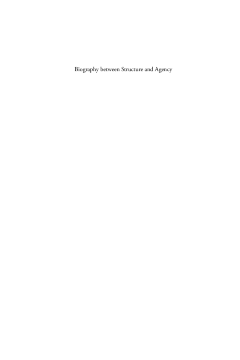
Additional Information
Book Details
Abstract
While bookstore shelves around the world have never ceased to display best-selling “life-and-letters” biographies in prominent positions, the genre became less popular among academic historians during the Cold War decades. Their main concern then was with political and socioeconomic structures, institutions, and organizations, or—more recently—with the daily lives of ordinary people and small communities. The contributors to this volume—all well known senior historians—offer self-critical reflections on problems they encountered when writing biographies themselves. Some of them also deal with topics specific to Central Europe, such as the challenges of writing about the lives of both victims and perpetrators. Although the volume concentrates on European historiography, its strong methodological and conceptual focus will be of great interest to non-European historians wrestling with the old “structure-versus-agency” question in their own work.
Contributors: Volker R. Berghahn, Hartmut Berghoff, Hilary Earl, Jan Eckel, Willem Frijhoff, Ian Kershaw, Simone Lässig, Karl Heinrich Pohl, John C. G. Röhl, Angelika Schaser, Joachim Radkau, Cornelia Rauh-Kühne, Mark Roseman, Christoph Strupp and Michael Wildt.
Volker Berghahn is the Seth Low Professor of History at Columbia University where he moved in 1998 from Brown University, after a longer spell of teaching at the University of Warwick in England. The author of more than a dozen books, he has long been interested in the challenges of modern biography. In 1993, he published a study of the industrialist Otto A. Friedrich and his role in the reconstruction of West German industry after 1945. His America and the Intellectual Cold Wars in Europe uses Shepard Stone—renowned journalist, Ford Foundation officer in charge of its European and international programs, and the first director of the Berlin Aspen Institute—as a window to the trans-Atlantic world of American and European intellectuals and scholars, many of whom were associated with the Congress for Cultural Freedom during the Cold War.
Simone Lässig has been Director of the Georg Eckert Institute for International Textbook Research in Braunschweig, Germany and Professor of Modern History at the University of Braunschweig since October 2006. From 2002 to 2006 she was a research fellow at the German Historical Institute in Washington, D.C. She has published mainly on modern German and Jewish history. Her last book focused on the question of how nineteenth century German Jews entered the bourgeoisie. She is currently preparing a biographical study on a German-American banking family.
